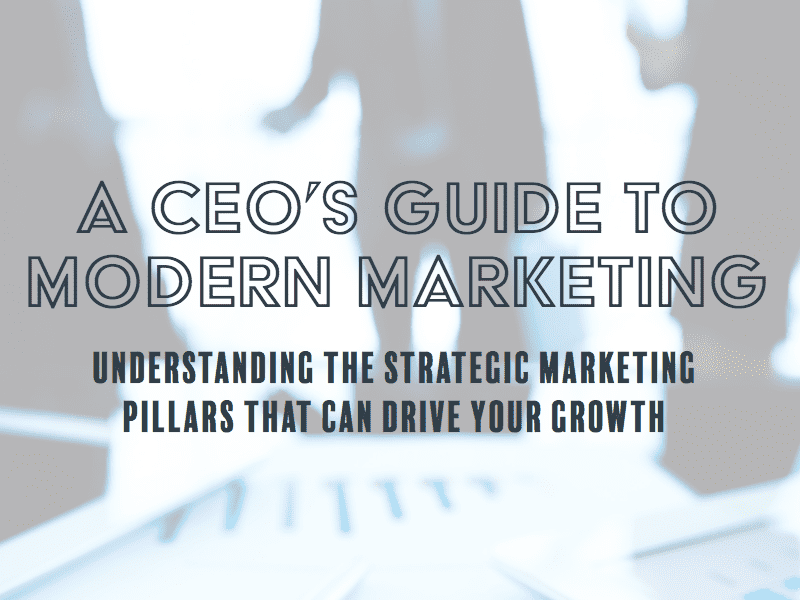4 Ways to Outsource Your Marketing Successfully
For B2B companies that are serious about accelerating their growth, outsourced marketing is often the best way to go. But before you jump in with both feet, you want to be sure you’re approaching it right. Because when, why and how you outsource your marketing will directly impact what you’ll gain in return.
If you outsource your marketing at the right time, for the right reasons, and take a best-practices approach to working with your marketing partner, you’ll achieve a high ROI. These four tips will get you off to a good start.
Tip #1: Know When It’s Time to Outsource
While every company’s experience is different, there are tell-tale signs that it’s time to consider outsourced marketing.
- You’re making little progress in achieving your growth goals.
- You’re not realizing a good ROI on your marketing efforts.
- Your marketing is mostly scattershot and random, not grounded in a strategy and not aligned with your business goals.
- You have an in-house generalist that can handle some tactical projects, but they don’t have the expertise to develop and lead the execution of a strategic marketing plan.
- You can no longer rely on referrals and cold calls to drive your growth.
- You’re not generating a predictable stream of leads that represent your ideal buyer.
Tip #2: Define What You Expect to Gain by Outsourcing
The more complicated the B2B buying environment becomes and the more specialized and complex the marketing discipline grows, the more B2B companies are turning to outsourced marketing as the most effective model. They’re finding this approach yields powerful advantages, especially compared to building a big in-house team or hiring a disparate group of freelancers.
Before moving ahead, consider whether these outsourced marketing advantages would benefit your business:
- Agility: An outsourced model gives you the flexibility to scale or flex your marketing based on new market opportunities, changing market conditions, regulatory developments, new product launches, or M&A activity, for example.
- Experience: An outsourced marketing firm gives you access to a team with broader and deeper experience than you can likely build in house—including industry-specific experience that’s tough to find in a full-time hire. It’s a more efficient way to tap all the areas of expertise that effective growth marketing demands, like marketing strategy, SEO, marketing technology, content development, marketing analytics, and more.
- Cost-efficiency: Why are some B2B companies able to achieve better marketing results than bigger competitors with bigger budgets? By outsourcing! When you outsource your marketing to an experienced partner, you optimize your budget by contracting for the exact skills and support you need—no more, no less. Since you’re not tying up budget on the overhead of a full in-house team, you’ll have more funds for marketing execution, including paid search, graphic design, marketing automation, or web development.
Tip #3: Choose the Right Outsourced Marketing Partner
Once you know it’s the right time to outsource, you need to select the best partner for the job. Steps like these will help you evaluate outsourced marketing firms thoughtfully and choose the best fit.
- Identify the skills and capabilities you need. Every B2B company’s must-have list will differ, but most share a few common criteria. If you don’t have a strategic marketing plan in place or a CMO or other senior-level marketer in-house, you need an outsourced partner that knows how to develop strategy-driven marketing plans. If you don’t have the technology infrastructure to engage in marketing that’s repeatable, sustainable, and predictable, then marketing technology expertise and strong data analytics are a must. And if building a thought leadership platform is an important strategy for your business, you need an outsourced marketing partner that’s done it successfully, many times.
- Evaluate providers critically. Just as you would when choosing any other service provider, take a thorough approach when evaluating outsourced marketing partners. Look for strong reviews and a proven track record of delivering measurable results, with case studies that show their clients are satisfied and achieving a high ROI. Expect your partner to follow an established, time-proven framework for approaching your marketing. (You don’t want them figuring out their approach on your dime!) And look for a disciplined approach to monitoring, measuring, optimizing, and reporting on results.
Tip #4: Set a Foundation for Success
As with any business relationship, outsourced marketing will only succeed if you and your partner work together effectively. In our experience, best practices like these will help you get the most from the arrangement.
- Invest in the relationship. Outsourced marketing works best when your partner functions like a member of your team. Plan to get your outsourced team fully integrated with your in-house team right from the start.
- Don’t shortcut the discovery process. A reputable firm won’t just dive into random tactics; they’ll start by doing a deep dive to research and assess your competitive and industry landscape, digital footprint, and SWOT (strengths, weaknesses, opportunities, and threats). This step sets the stage for developing a strategic go-to-market plan that will achieve your goals, so give it the time and attention it deserves.
- Agree on expectations. Be sure to get on the same page about your goals and timelines, how you’ll communicate, how often your partner will report on results, and other operational issues.
- Be patient! Effective marketing takes time, especially if you don’t already have a solid foundation. Your outsourced partner will start by getting the right processes, people, and technology in place and developing a strategic marketing plan that aligns with your business goals. But they can also look for quick-win marketing opportunities in parallel, to help cover some of your upfront investment.
How Do You Know It’s Working?
While we could write a book on the topic of how to measure marketing success (and in fact, we’ve written a blog or two on the subject!), for now we’ll answer the question at a high level.
Assessing the success of your outsourced marketing involves defining measurable goals, establishing key performance indicators (KPIs) that align with them, and using data analytics to continually monitor and measure performance. While every company is unique, the following are some common ways that B2B companies measure outsourced marketing success:
- More leads. A higher volume of Marketing Qualified Leads (MQLs), Sales Accepted Leads (SALs), and Sales Qualified Leads (SQLs) means your marketing is attracting the right buyers to your revenue funnel.
- More conversions. A higher conversion rate throughout the sales funnel means your marketing is driving buyers to action.
- More website traffic. B2B buyers want to learn as much as possible online before they engage with your sales team, so you want more buyers spending more time on your site.
- More social media engagement. When buyers engage with you on social channels (commenting, sharing, and following your page), that means your message is resonating.
- Lower customer acquisition cost (CAC). Understanding the right metrics for your industry is key. For SaaS companies, using an ROI metric like CAC, is critical.
- Higher revenue. For high-growth companies, accelerating revenue is one of the most important marketing goals. If your outsourced marketing is driving steady, predictable revenue that is profitable, then you know you’re doing it right!
Marketri is the outsourced marketing partner that B2B companies choose when they want to accelerate their growth. Schedule an introductory call with our CEO Deb Andrews to learn how our Marketing Momentum Model can drive more revenue for your business!
Learn how we helped a SaaS company hit its quarterly targets by driving sales-ready leads.





